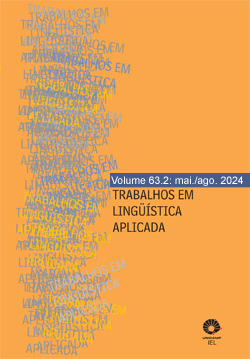Resumen
En esta investigación narrativa, narro y compongo el sentido de una experiencia como profesora de inglés que diseñó un curso que integraba premisas de gamificación y juego digital para fomentar el compromiso y la participación central de los estudiantes. Comienzo explicando el contexto en el que se desarrolló la investigación y exponiendo las razones de mi propuesta. Posteriormente, repaso la tarea propuesta, en la que los alumnos respondieron a un cuestionario sobre los rasgos que les gustaría mantener o cambiar en mí como su profesora de inglés, si tuvieran la oportunidad. Sus respuestas fundamentaron la redacción de un poema, lo que evidenció la necesidad de que yo me apartara de los focos. La siguiente experiencia narrada fue hacer que mis alumnos gamificaran su prueba oral final mientras yo intentaba hacer de guía al margen. Aprendí que su participación central conducía al compromiso y a una actitud positiva hacia el proceso de aprendizaje. También comprendí que mi afán por ser un guía al margen y no un sabio en el escenario no era suficiente. Lo que realmente me despertó a revisar continuamente mi identidad profesional fue haber vivido la experiencia junto a ellos.
Citas
BENGEZEN, V. C. As histórias de autoria que vivemos nas aulas de inglês do sexto ano na escola pública. 2017. 208 f. Tese (Doutorado em Estudos Linguísticos) - Universidade Federal de Uberlândia, Uberlândia, 2017.
BROUGÈRE, G. (1998) Jogo e educação. Tradução de Patrícia Chittoni Ramos. Porto Alegre: Artes Médicas.
BUTLER-KISBER, L. (2002) Artful portrayals in qualitative inquiry: the road to found poetry and beyond. The Alberta Journal of Educational Research, v. 48, p. 229-239.
CAILLOIS, R. (1967) Los juegos y los hombres: la máscara y el vértigo. Tradução de Jorge Ferreira. México: Fondo de Cultura Económica, 1986. Título original: Les jeux et les hommes: la masque et le vertige. Paris: Éditions Gallimarde.
CLANDININ, J. D. (Ed.). (2007) Handbook of narrative inquiry: mapping a methodology. Thousand Oaks; London; New Delhi: Sage;University of Alberta.
CLANDININ, D. J. (2013) Engaging in narrative inquiry. New York: Routledge.
CLANDININ, D. J. (2020) Journeys in narrative inquiry: the selected works of D. Jean Clandinin. Oxon; New York: Routledge.
CLANDININ, D. J.; CAINE, V.; ESTEFAN, A.; HUBER, J.; MURPHY, M. S.; STEEVES, P. (2015) Place of practice: learning to think narratively. Narrative works: issues, investigations, & interventions, v. 5, n. 1, p. 22-39.
CLANDININ, D. J.; CONNELLY, F. M. (1995) Teachers’ professional knowledge landscapes. Advances in Contemporary Educational Thought, v. 15. New York;London: Teachers’ College Press.
CLANDININ, D. J.; CONNELY, M. (2000) Narrative Inquiry. Complementary methods for research in education. 1st edition. Washington: American Educational Research Associates.
CLANDININ, D. J.; CONNELY, M. (2015) Pesquisa Narrativa: experiência e história em pesquisa qualitativa. 2 ed. rev. Tradução: GPNEP: Grupo de pesquisa narrativa e educação de professores. ILEEL (UFU). Uberlândia: EDUFU.
CONNELLY, F. M.; CLANDININ, D. J. (1988) Teachers as curriculum planners: narratives of experience. USA; Canada: Teachers’ College Press; The Ontario Institute for Studies in Education.
CONNELLY, F. M.; CLANDININ, D. J. (Ed.) (1999) Shaping a professional identity: stories of educational practice. New York; London: Teachers’ College Press.
CONNELLY, F. M.; CLANDININ, D. J. Narrative Inquiry. (2006) In: GREEN, J.; CAMILLI, G.; ELMORE, P. (Ed.). Handbook of complementary methods in education research. 3 ed. Mahwah, NJ: Lawrence Erlbaum, p. 477-487.
DETERDING, S. et. al. (2012) From game design elements to gamefulness: defining “gamification”. Mindtrek.
DEWART, G.; KUBOTA, H.; BERENDONK, C.; CLANDININ, J.; CAINE, V. (2020) Lugone’s metaphor of ‘World-traveling’ in Narrative Inquiry. Qualitative Inquiry, v. 26, n. 3-4, p. 369-378.
DEWEY, J. (1938) Experience and Education. New York: Kappa Delta Pi.
ELY, M.; VINZ, R.; DOWNING, M.; ANZUL, M. (2001) On writing qualitative research: living by words. London; Philadelphia: Routledge Falmer, [1997].
HOLLINGSWORTH, S.; DYBDAHL, M. (2007) Talking to learn: the critical role of conversation in narrative inquiry. In: CLANDININ, J. D. (Ed.). Handbook of narrative inquiry: mapping a methodology. Thousand Oaks; London; New Delhi: Sage/University of Alberta, p. 146-176.
HUBER, J.; CLANDININ, D. J. (2005) Living in tension: negotiating a curriculum of lives on the professional knowledge landscape. In: BROPHY, J.; PINNEGAR, S. (Ed.). Learning from research on teaching: perspective, methodology and representation. Oxford: Elsevier Ltd., p. 313-336.
HUIZINGA, J. (1993) Homo Ludens: o jogo como elemento da cultura. 4 ed. Tradução de João Paulo Monteiro. São Paulo: Editora Perspectiva. (vom Ursprung der Kultur im Spiel, 1938).
KAPP, K. M. (2012) The gamification of learning and instruction: game-based methods and strategies for training and education. San Francisco: Pfeiffer.
LEE, J. J.; HAMMER, J. (2011) Gamification in education: what, how, why bother? Academic Exchange Quarterly, v. 15, n. 2.
LUGONES, M. (1987) Playfulness, “world-travelling”, and loving perception. Hypatia: a journal of feminist philosophy, v. 2, n, 2, p. 3-19.
MANZANO-LEÓN, A.; CAMACHO-LAZARRAGA, P.; GUERRERO, M. A.; GUERRERO-PUERTA, L.; AGUILAR-PARRA, J. M.; TRIGUEROS, R.; ALIAS, A. (2012) Between level up and game over: a systematic review of gamification in education. Sustainability, v. 13, n. 2247. Available at: https://doi.org/10.3390/su13042247. Access on: April 21st 2024.
MELLO, D. M. (2004) Histórias de subversão do currículo, conflitos e resistências: buscando espaço para formação de professores na aula de língua inglesa no curso de Letras. 225 f. Tese (Doutorado) – Pontifícia Universidade Católica de São Paulo, São Paulo.
PESCE, C. ESL Teachers ask: How can I gamify my ESL classroom? In: Busy Teacher. Available at: http://busyteacher.org/20574-gamify-esl-classroom.html. Access on: December 31st, 2019.
RICHARDSON, L. (2002) Writing: a method of inquiry. In: DENZIN, N. K.; LINCOLN, Y. S. Handbook of qualitative research. 2 ed. Thousand Oaks, CA: Sage, p. 923-948.
SAMAH, N. A. (2019) Who am I in my story of teaching? confronting my puzzle of practice through narrative inquiry. Nitel Sosyal Bilimler, v. 1, n. 1, p. 1-21.
ZEMBYLAS, M.; CHUBBUCK, S. (2018) Conceptualizing ‘teacher identity’: a political approach. In: SCHUTS, P. A.; HONG, J.; FRANCIS, D. C. Research on teacher identity: mapping challenges and innovations. Springer, Cham, p. 183-193.

Esta obra está bajo una licencia internacional Creative Commons Atribución 4.0.
Derechos de autor 2024 Valeska Virgínia Soares Souza


